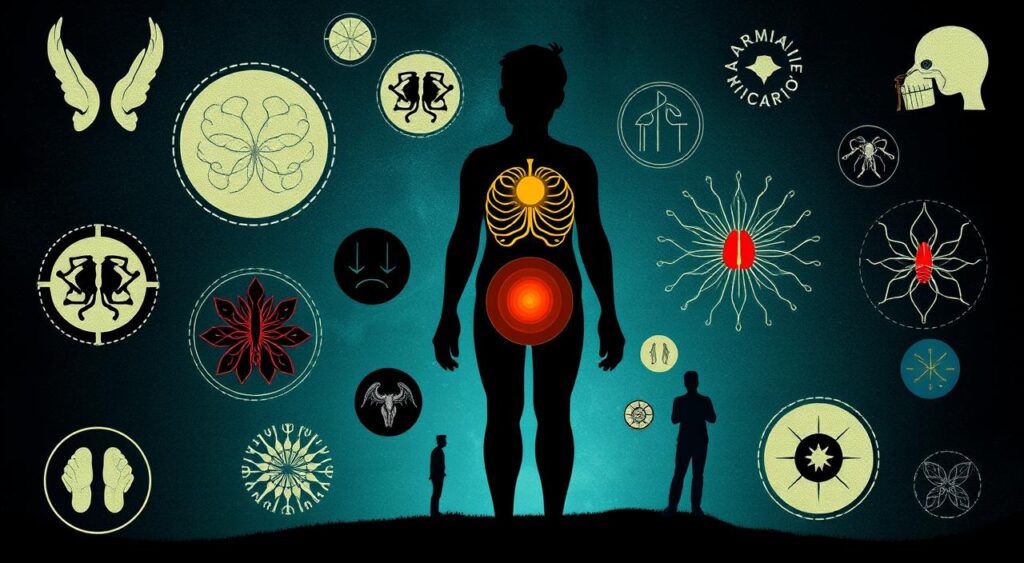About 2-5 people per million have Cushing’s Syndrome. It’s caused by too much cortisol, a hormone from the adrenal gland. This hormonal disorder can be very serious if not treated right away. It’s important to know about cortisol and how it affects the body to catch Cushing’s Syndrome early.

Cushing’s Syndrome is a complex condition that needs a detailed treatment plan. Knowing the signs can help people get medical help early. Understanding cortisol’s role is key because it’s central to Cushing’s Syndrome.
Key Takeaways
- Cushing’s Syndrome is a rare hormonal disorder caused by high levels of cortisol.
- Understanding cortisol and its role in the body is essential for diagnosis and treatment.
- Cushing’s Syndrome can have severe consequences if left untreated.
- Recognizing the signs and symptoms of this adrenal gland disorder is critical for timely medical attention.
- Comprehensive management and treatment are necessary to prevent long-term complications.
- Cushing’s Syndrome affects 2-5 people per million, making it a relatively rare condition.
- Early diagnosis and treatment can significantly improve outcomes for individuals with Cushing’s Syndrome.
Understanding Cushing’s Syndrome
Cushing’s Syndrome is a complex endocrine disorder. It happens when the body gets too much cortisol for a long time. This can be due to taking corticosteroid medicines or having a tumor on the pituitary gland. Knowing about cortisol and the types of Cushing’s Syndrome is key.
Cortisol is a hormone from the adrenal gland. It helps the body deal with stress and controls blood sugar. Too much cortisol can cause Cushing’s Syndrome, affecting the body and mind badly.
What is Cushing’s Syndrome?
Cushing’s Syndrome is an endocrine disorder. It’s caused by too much cortisol. Symptoms include weight gain, high blood pressure, and skin changes.
The Role of Cortisol
Cortisol is important for stress response and blood sugar control. But too much can cause Cushing’s disease. This needs quick medical help.
Types of Cushing’s Syndrome
There are several types of Cushing’s Syndrome. Cushing’s disease comes from a pituitary gland tumor. Other types include exogenous Cushing’s from corticosteroids and ectopic Cushing’s from tumors elsewhere.
Knowing the different types of Cushing’s Syndrome is vital. It helps in finding the right treatment. Recognizing symptoms and getting medical help early is crucial for managing this complex disorder.
Common Signs and Symptoms
Cushing’s Syndrome shows many signs and symptoms. These are mainly due to too much steroid hormone in the body. Cortisol, a key hormone, is often too high because of the adrenocorticotropic hormone (acth).
Weight gain, especially in the belly, high blood pressure, and skin and hair changes are common signs. Weight gain is often the first sign. It happens because cortisol helps the body store more fat.
Other symptoms include:
- Thin, fragile skin that bruises easily
- Purple stretch marks on the abdomen, thighs, and buttocks
- High blood pressure and increased risk of cardiovascular disease
- Mood changes, such as anxiety, depression, and irritability
Cushing’s Syndrome also affects mental and emotional health. It’s crucial to see a doctor if you notice these symptoms. Early treatment can help manage the effects of too much steroid hormone and acth imbalance.
| Symptom | Description |
|---|---|
| Weight gain | Excess fat storage in the abdominal area |
| High blood pressure | Increased risk of cardiovascular disease |
| Skin changes | Thin, fragile skin that bruises easily |
Causes of Cushing’s Syndrome
Cushing’s Syndrome is a complex condition with many causes. It can be caused by taking too much corticosteroid medication or by a pituitary tumor. This tumor makes too much adrenocorticotropic hormone (ACTH). This hormone makes the adrenal gland disorder produce too much cortisol.
Some of the main causes of Cushing’s Syndrome are:
- Exogenous causes: taking too much corticosteroid medication
- Endogenous causes: pituitary tumor, adrenal gland tumors, or inherited Cushing’s Syndrome
- Risk factors: family history, certain health conditions, and lifestyle choices
Knowing the causes of Cushing’s Syndrome is key to treating it. Doctors use physical exams, lab tests, and imaging to find the cause. This might be a pituitary tumor or adrenal gland disorder.
In some cases, Cushing’s Syndrome is caused by a rare genetic disorder like multiple endocrine neoplasia type 1 (MEN1). It’s important to get help from a doctor to find the cause and plan treatment.
| Cause | Description |
|---|---|
| Exogenous | Prolonged use of corticosteroid medications |
| Endogenous | Pituitary tumor, adrenal gland tumors, or inherited Cushing’s Syndrome |
| Risk factors | Family history, certain health conditions, and lifestyle choices |
The Impact on Your Body
Cushing’s syndrome can greatly affect your body. It changes how your body works and feels. One big change is the imbalance of cortisol, a hormone that helps with metabolism, bone health, and mood.
Too much cortisol can cause weight gain, especially around the belly. It can also lead to bone loss, raising the chance of osteoporosis.
Some common effects of Cushing’s syndrome include:
- Metabolic changes, such as high blood sugar and high blood pressure
- Mood disturbances, including anxiety and depression
- Cognitive impairment, such as memory loss and difficulty concentrating

Understanding how Cushing’s syndrome affects your body is key. It helps in finding the right treatment and ways to manage it. By knowing the signs and symptoms, you can get help and work on balancing your cortisol levels. This can greatly improve your health and well-being.
| System | Effect of Cushing’s Syndrome |
|---|---|
| Metabolic | Weight gain, high blood sugar, high blood pressure |
| Musculoskeletal | Bone loss, osteoporosis |
| Psychological | Anxiety, depression, cognitive impairment |
Diagnosis Methods and Tests
Diagnosing Cushing’s Syndrome is complex because its symptoms can look like other conditions. Doctors first check cortisol levels in blood, urine, or saliva. This helps spot hypercortisolism, a key sign of Cushing’s Syndrome.
To confirm the diagnosis and find the cause, more tests may be needed. These include:
- Imaging tests, like CT or MRI scans, to see the pituitary or adrenal glands
- Infusion tests, where a hormone-stimulating substance is injected to see how the body reacts
- Inferior petrosal sinus sampling, taking blood from veins near the pituitary gland to measure cortisol
It’s crucial to rule out other conditions that might look like Cushing’s Syndrome. By using these tests, doctors can accurately diagnose Cushing’s Syndrome. Then, they can create a treatment plan to manage it.
Early diagnosis and treatment can greatly improve life for those with Cushing’s Syndrome. It can reduce the risk of complications and health problems.
| Diagnostic Test | Description |
|---|---|
| 24-hour urine free cortisol test | Measures cortisol levels in urine over a 24-hour period |
| Midnight cortisol test | Measures cortisol levels in blood or saliva at midnight |
| Dexamethasone suppression test | Assesses the body’s response to a hormone-suppressing substance |
Treatment Options and Approaches
People with Cushing’s Syndrome aim to get their cortisol levels back to normal. This helps ease symptoms. Doctors use different treatments like medicines, surgery, and radiation. For Cushing’s disease, the main goal is to treat the pituitary tumor. This reduces the hormone that causes too much cortisol.
Medicines are a common treatment for Cushing’s Syndrome. They help lower cortisol levels in the body. This can help with weight gain, high blood pressure, and mood swings. Medicines may also treat related issues like diabetes or high blood pressure.
Medical Treatments
- Medications to reduce cortisol production
- Medications to block the effects of cortisol
- Treatments for related conditions, such as diabetes or high blood pressure

Surgical Interventions
Surgery is needed when a tumor is present, like in Cushing’s disease. The surgery aims to remove the tumor. This helps the pituitary gland work right again, reducing ACTH and cortisol levels. Sometimes, the adrenal gland is also removed to stop cortisol production.
| Treatment Approach | Description |
|---|---|
| Medical Treatments | Medications to reduce cortisol production or block its effects |
| Surgical Interventions | Removal of tumor or adrenal gland to reduce cortisol production |
| Radiation Therapy | Targeted radiation to destroy tumor cells and reduce cortisol production |
Radiation Therapy
Radiation therapy is used when surgery isn’t an option. It uses targeted radiation to kill tumor cells and lower cortisol levels. This method is effective for treating Cushing’s disease and other forms of Cushing’s Syndrome.
Living with Cushing’s Syndrome
Managing an adrenal gland disorder like Cushing’s Syndrome is a big task. Patients must work closely with their doctors to keep their cortisol levels in check. This might mean regular blood tests, taking medicine, and making lifestyle changes.
Here are some ways to handle Cushing’s Syndrome:
- Eating a healthy, balanced diet helps control blood sugar and cortisol levels.
- Regular exercise reduces stress and boosts health.
- Enough sleep helps regulate hormones and fights off fatigue.
Living with Cushing’s Syndrome is tough, but it’s doable with the right care and support. It’s key to stay up-to-date with new research and treatments. Working with a healthcare team to create a personalized plan is crucial.
By being proactive in managing Cushing’s Syndrome, patients can lessen their symptoms. They can also improve their health and well-being. With the right attitude and support, it’s possible to overcome the challenges of this adrenal gland disorder.
| Management Strategies | Benefits |
|---|---|
| Medication | Regulates cortisol levels, reduces symptoms |
| Lifestyle Changes | Improves overall health, reduces stress |
| Regular Monitoring | Helps track progress, identifies potential issues |
Complications and Long-term Effects
Cushing’s syndrome is a condition where the body has too much cortisol. This can cause many problems if not treated right. It affects the body and mind in different ways.
Getting a diagnosis early and starting treatment is key. This helps avoid serious issues. Problems like osteoporosis, diabetes, and high blood pressure can happen. These issues can really lower your quality of life and raise the chance of more health problems.
Physical Complications
- Osteoporosis: Weakened bones due to excessive cortisol levels
- Diabetes: Insulin resistance and high blood sugar levels
- Hypertension: Elevated blood pressure, increasing the risk of cardiovascular disease
Psychological Impact
Cushing’s syndrome can also affect your mind. You might feel anxious, depressed, or have mood swings. The emotional side of this condition is very important. Getting help from a counselor or therapist can be really helpful.
It’s very important to work with your doctor to manage Cushing’s syndrome. This way, you can avoid long-term problems. By knowing the risks and taking action, you can keep your health better and feel better overall.
Prevention and Risk Reduction
To prevent Cushing’s Syndrome and lower its risk, several strategies can be used. Avoiding the long-term use of corticosteroids is key. This can help avoid an endocrine disorder. Also, managing stress with meditation or yoga is helpful.
Regular health check-ups are vital for early detection and prevention. They help monitor hormone levels and overall health. This way, issues can be caught early. Sometimes, a pituitary tumor causes Cushing’s Syndrome, making regular screenings important.
- Avoiding corticosteroid use when possible
- Managing stress through relaxation techniques
- Regular health check-ups to monitor hormone levels
- Maintaining a healthy lifestyle, including a balanced diet and regular exercise
By following these steps, people can lower their risk of Cushing’s Syndrome. This helps manage an endocrine disorder better. Early detection and prevention are crucial for managing this condition and avoiding long-term problems.
| Strategy | Description |
|---|---|
| Avoid corticosteroid use | Minimize the risk of developing Cushing’s Syndrome |
| Manage stress | Reduce the impact of stress on hormone levels |
| Regular health check-ups | Monitor hormone levels and detect potential issues early |
Support and Resources
Living with Cushing’s Syndrome can be tough, but the right support makes a big difference. People with this disease often have too many steroid hormones. This can cause many symptoms. Knowing how ACTH controls cortisol levels is key to managing the condition.
There are many resources to help cope with Cushing’s Syndrome. These include:
- Support groups, where people can share their stories and connect with others facing similar challenges
- Medical resources, like online forums and educational websites, that offer reliable info and expert advice
- Lifestyle tips, such as stress management and healthy eating, to help ease symptoms and boost well-being
Having a support network is crucial, whether online or in local groups. It helps people feel less alone and more able to manage their condition. By using reliable medical info and healthy habits, those with Cushing’s can take charge of their health and live better.
By using these resources and support networks, people with Cushing’s can handle the challenges better. This helps reduce the effects of too many steroid hormones. It also improves their health and overall well-being.
| Resource | Description |
|---|---|
| Support Groups | Online and in-person communities for individuals with Cushing’s Syndrome |
| Medical Resources | Online forums, educational websites, and expert advice |
| Lifestyle Management Tips | Stress reduction techniques, healthy eating habits, and exercise routines |
Conclusion
As we wrap up our look at Cushing’s syndrome, a complex adrenal gland disorder, it’s key to see its full picture. This condition, marked by too much cortisol, is tough to manage. But, thanks to ongoing research and new treatments, there’s hope for those dealing with it.
Understanding Cushing’s syndrome and its many signs helps people work with their doctors. Together, they can create a detailed care plan. This team effort, along with self-care and lifestyle changes, helps patients face the physical and mental challenges of Cushing’s.
The medical field is getting better at treating this condition, offering more ways to improve life. With determination, patience, and a focus on health, those with Cushing’s can beat the odds. They can look forward to a brighter future.
FAQ
Q: What is Cushing’s Syndrome?
A: Cushing’s Syndrome is a hormonal disorder. It happens when you have too much cortisol in your body. This can come from outside sources or an imbalance inside you.
Q: What role does cortisol play in the body?
A: Cortisol is important for many things. It helps with metabolism, immune response, and how we handle stress. But too much cortisol can cause Cushing’s Syndrome.
Q: What are the common signs and symptoms of Cushing’s Syndrome?
A: Signs include weight gain, especially in the belly. You might also have high blood pressure, skin and hair changes, and mood swings. These happen because of too much cortisol, often from a tumor.
Q: What are the causes of Cushing’s Syndrome?
A: It can come from taking too many corticosteroids or from tumors that make too much ACTH. Family history and some medical conditions can also increase your risk.
Q: How does Cushing’s Syndrome impact the body?
A: It can mess with your metabolism, weaken bones, and affect mood and thinking. Too much cortisol is the main problem. If not treated, it can cause serious health issues.
Q: How is Cushing’s Syndrome diagnosed?
A: First, doctors check your cortisol levels. Then, they might use PET scans or other tests. They also make sure it’s not something else.
Q: What are the treatment options for Cushing’s Syndrome?
A: Doctors might use medicine to lower cortisol, surgery to remove tumors, or radiation. The goal is to get your cortisol back to normal and ease symptoms.
Q: What are the potential complications and long-term effects of Cushing’s Syndrome?
A: It can lead to osteoporosis and diabetes, and also affect your mood. Catching it early and treating it right can help avoid these problems.
Q: How can Cushing’s Syndrome be prevented or its risk reduced?
A: To prevent it, avoid long-term corticosteroids, manage stress, and get regular health checks. This can help catch it early.
Q: What resources are available for individuals living with Cushing’s Syndrome?
A: There are support groups, medical resources, and tips for managing your life. Having a support network and good medical info can help you cope.
